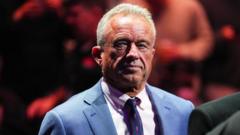The former presidential candidate is leveraging his position to advocate for stringent food regulations to combat health issues linked to processed foods.
**Can RFK Jr. Transform America's Diet for the Better?**

**Can RFK Jr. Transform America's Diet for the Better?**
RFK Jr. aims to revamp the American food landscape, targeting unhealthy ingredients and processes.
Robert F. Kennedy Jr. has made headlines with ambitious plans to overhaul the way Americans eat, focusing on the dangers of ultra-processed foods, harmful food additives, and questionable dietary practices. As President-elect Trump's selection for the Department of Health and Human Services (DHHS), Kennedy believes it is imperative to address the negative health impacts caused by certain commercial food products, from the artificial dyes in breakfast cereals to the seed oils commonly found in fast foods.
Kennedy's rallying cry against the food industry posits that "we are betraying our children by allowing food industries to poison them," a sentiment echoed by health advocates who share his concerns. However, to implement substantial changes, he will need to challenge powerful food corporations that have long resisted regulatory scrutiny.
Despite skepticism surrounding his controversial past health claims—such as those connecting vaccines to autism—Kennedy's vision for food reform has garnered support from a wide spectrum of stakeholders, including some members of Congress. Colorado’s Democratic Governor Jared Polis expressed cautious optimism about Kennedy's commitment to public health, proving that bipartisan backing may exist in unexpected quarters.
Under his banner of "Make America Healthy Again", Kennedy has suggested radical moves like removing ultra-processed foods from school lunch programs—a necessary change, he argues, for improving children’s health outcomes. Yet, executing such proposals would require restructuring Food and Drug Administration (FDA) policies and taking on established industries accustomed to minimal oversight.
Kennedy has been vocal about tackling the complex bureaucratic landscape that governs food safety. He asserts the need for a transformative shakeup at the FDA, hinting at major personnel changes in pursuit of better monitoring of food substances. His suggestions also include reevaluating food dyes and additives currently permitted in American products, positing that many are potential carcinogens that should be banned.
However, experts remain divided on the practicality of Kennedy's ambitious goals. While many agree that reducing the prevalence of ultra-processed foods is vital for chronic disease prevention, they warn that his proposals may undercut scientific consensus or face significant pushback from the food industry. The FDA's limited authority over classifications like "ultra-processed foods" complicates Kennedy's plan, requiring collaboration across multiple government agencies tasked with different facets of food regulation.
Additionally, the industry has mobilized early against potential reform, pre-emptively lobbying lawmakers to voice their opposition to Kennedy’s agenda. The Food Industry Association has stated an intent to work collaboratively with the new administration, emphasizing evidence-based food policy rather than sweeping changes that lack empirical support.
While Kennedy may have the drive to stimulate a dialogue about America's dietary habits, the road to reform is fraught with political and operational challenges. Public health experts caution that improving dietary health will require more than just regulatory edicts; it necessitates a comprehensive approach that balances consumer well-being with the interests of food producers. Nonetheless, there remains a possibility for RFK Jr. to guide policy changes within existing frameworks—if he can effectively engage with the complexities of American food systems and navigate the polarization that his past actions have generated.























